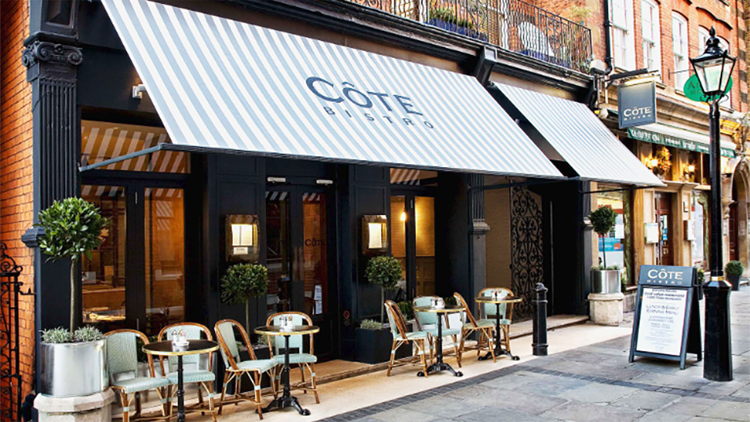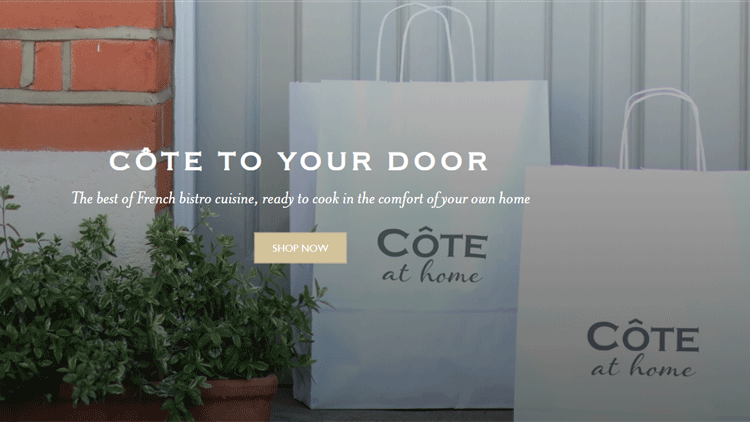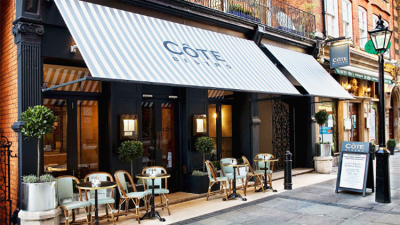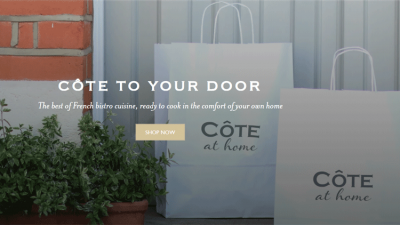French revolution: how Côte is going after the next generation

Anyone who has started a new job during lockdown can surely relate to the strangeness of settling into a new role remotely. For Jane Holbrook, executive chair at Côte Restaurants, the experience has been “bonkers” since joining with new owner Partners Group in September, her nine months in charge feeling more like three.
The situation has inevitably meant Holbrook’s plans for the French brasserie brand are at a more formative stage than the otherwise would have been. Though that’s not to suggest the broad vision lacks ambition – it’s just Holbrook and her management team are still working on the detail.
“The ambition for this is huge,” she says. “We just need to take our time working out what we’re going to do.”
Despite her protestations that the turnaround journey has only just begun, Holbrook is remarkably clear and candid on the direction she feels it needs to go. “What we don’t want to do is kid anyone that we’ve got it to where we need it to be. We’re on a journey.”
Doing a Wagamama
Holbrook turned down the same job at PizzaExpress after Partners Group, the global private equity firm that has $109bn under management, asked her “come and play”. Partners owned £250m worth of debt in Côte and took ownership of the brand in pre-pack acquisition in September of last year.
“I thought, there’s something in this. I could just feel it, I could smell it. I thought, we can do a Wagamama on this one, we can take it from a bit broken, to a beautiful thing that is a force for good.”
During the course of the interview, Holbrook apologises for repeatedly mentioning the ‘W’ word – though for good reason. With stints as CFO, COO and CEO she was part of the management team that turned Wagamama into the sector-leading brand it is today, initially joining it when it was “two minutes away from going bust”, she says. “People forget that, because now it’s glorious.”
The plain-speaking CEO repeatedly cites the now TRG-owned concept, because she sees strong parallels with the opportunity at Côte, a strong brand which she hesitates to say has lost its way. “We took Waga when it was worth zero and sold it for the best part of £600m five years later,” she says, underlining the potential scale of the opportunity.
Holbrook emphasises the need to make Côte more contemporary and appeal to a new cohort of consumers. The restaurant group has become mired in the traditional, heavy, meat and cream section of French cuisine, she says, with little in the way of contemporary, vegan or vegetarian dishes.
"I thought, we can do a Wagamama on this one,
we can take it from a bit broken,
to a beautiful thing that is a force for good”
“We want to make it a bigger part of the eating out marketplace. We’ve got to make it more relevant. People say there’s no vegetarian food in France, but it’s rubbish. There are more vegan restaurants in Paris than any other city of the world.”
Another key part of the plan is an overhaul of the look and feel, which she describes as “bit dated”, with plans to brighten the colour palette up. “It’s really to take it from where it is, to be an iconic brand again.”
Upon joining, Holbrook says she was pleasantly surprised - shocked even - by the quality of ingredients at Côte, and sees this as key to its new messaging. “When you think about French regional cooking, there’s so much in it, but the menu has been dumbed down. We want to get more French, more regional, more fun. We have some new values, about ‘living life full of flavour’.”
This sense of fun and flavour will look to celebrate French individuality, not caricature it, she insists. “Modern French, not Disneyland. It’s taking the best of what we’ve got and evolving it.”
Changing customer perceptions
A major focus for the brand during lockdown was conducting market research and learning more about guest perceptions of Côte. A key takeaway from the findings was that the brand was often seen as second choice for consumers, emphasising the need to be more special and distinctive – and appeal to a younger consumer.
“The customers have aged with the brand, it’s not had younger people coming through,” says Holbrook. “That’s what we’ve got to do.”
When the acquisition was announced, much was made in the press release about how profitable Côte had been pre-Covid. Only three restaurants were closed as part of the deal, under the Limeyard and Jackson & Rye brands, with 93 core restaurants staying open.
If it was indeed so successful pre-Covid, is there a risk of alienating its core customer-base with the revamp? “Truly profitable companies rarely go bust,” Holbrook responds. “Let’s put it like that. Did it go bust because of Covid, or was it heading that way? I’ll leave that to your imagination.
“I think the reality was, Covid might have tipped it over the edge, but it probably would have gotten there anyway.”
One of its problems as Holbrook sees it was Côte’s over reliance on its fixed price menu. “When you start to rely heavily on discounting, you can only go one way. You’re talking about value all the time; you’ve become a value proposition. Côte was always meant to be good value, but not cheap.”
A new focus is on a core menu that Holbrook describes as ‘everyday special’, moving away from the idea of being value for money. “We don’t want to be Lidl, we don’t want to be in a race to the bottom.”
Instead, Côte will remain a “democratic” brand, and won’t alienate its customers, but there will be some premium dishes on the menu, as well as more entry-level options. “It’s somewhere where you can rock up, have a good time, with decent service and some nice food. It’s the top end of the mid-market we’re aiming for.”
Building a category of one
Unlike the crowded Italian casual dining segment where brands continually jostle for custom, Côte sits in a category with only a handful of direct competitors – namely Café Rouge and Brasserie Blanc. The end game, says Holbrook, is to build a “category of one”, so when consumers want to eat French food, they automatically opt for to Côte.
“That’s why we want to dial up the Frenchness. The menu’s got quite a lot of Italian and some random stuff. Over time we will dial up the regionality. We’re not going to be serving duck tongue. It won’t be stuff that people go, ‘wowzers!’”
With an eye on social media, there will be more Instagramable desserts, and a vegan crème brûlée. In a contemporary twist on France’s immigrant communities, there will also be some harissa and couscous in reference to the street markets of Marseille.
With plenty of work to do on the brand and offering, Holbrook is at least broadly happy with the remaining property estate. Going forward, the business will double down on opening larger footprint restaurants rather than smaller ones.
“It’s exactly what we did at Wagamama. We’ve got to get bigger restaurants, because then you’ve got the atmosphere, you get really great quality GMs, and you can do great things and make more money.”
Outside the core restaurant business, there is also the Côte at Home offering, which was a lockdown success story and trailblazer for casual dining brands pivoting. While volumes have inevitably decreased as dine-in has reopened, it continues to reach a new type of customer – in places such as Devon, the Cotswolds and even the Scottish Highlands.
It’s a successful pivot that will has doubt pleased the investors, but the feeling is mutual. Having worked with many private equity groups, Holbrook describes Partners as a perfect cultural fit, with the same working-class, egalitarian ethos as the management team at Côte.
“I think they’re amazing,” she says. They’re very humble, there’s no delusions of grandeur. Their values are genuinely around making the world a better place. It is in their core.
“Every time we’ve said, ‘oh no, we’re closing again’, or we we’ve just shaved £2m off the P&L, they say, 'fine, we knew this would be hard, we’re in this for the long term, we want to make this a beautiful thing'.”
This is a version of an article that first appeared on BigHospitality’s sister website MCA. To subscribe to its breaking news feed, click here















